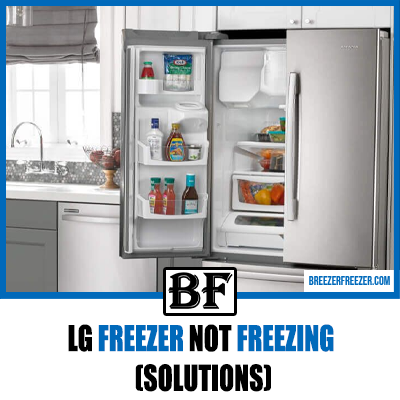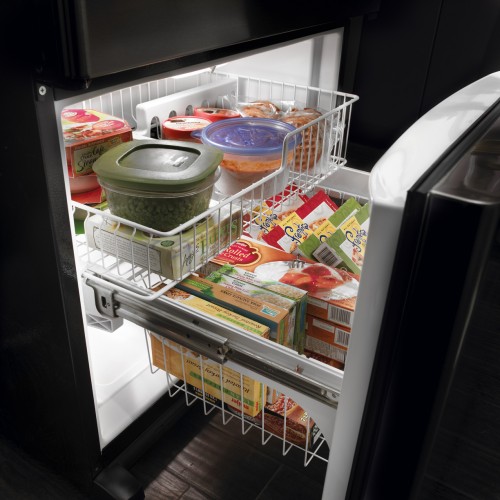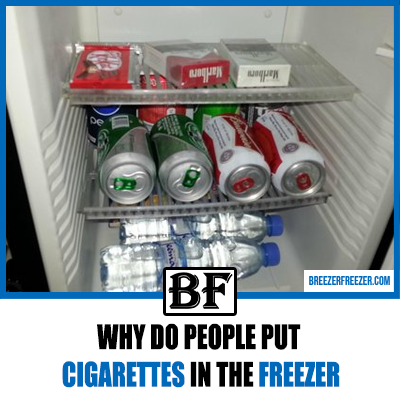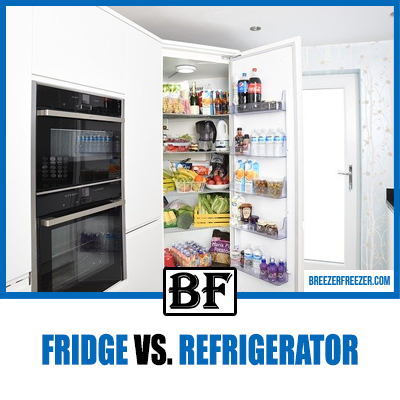Kenmore Refrigerator Making Noise (Solutions)
You come home from work and head straight for the freezer to pour a chilled beer – a much-needed drink after a tiring day.

But instead of cold beer, you find it’s mildly warm, and there appears to be a strange noise coming from the fridge. Unsure what to do, you switch off the fridge and turn it on again, hoping that this simple trick works.
Unfortunately, it doesn’t, and to make matters worse, the noise from the refrigerator is getting louder than before. What should you do now?
Read our guide, of course, because we have highlighted how to solve all common noise issues of a Kenmore refrigerator.
Kenmore Refrigerator Making Noise
There’s more than one kind of noise that a faulty Kenmore refrigerator may produce – on the bright side, we know about most of these issues. Here, we have highlighted the different kinds of noise and how to resolve the problem.
1. Humming Noise
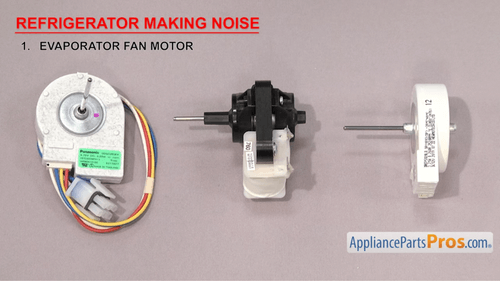
A loud humming noise could point to an issue with the freezer, so check whether the noise ceases after opening the freezer door. When you no longer hear anything, there’s an issue with the evaporator fan motor, and it’s important to replace it ASAP.
Check the fan first and call a licensed technician because if it’s in top condition, the problem may lie in the condenser fan motor. It would be best to clean the fan blades, remove possible obstructions, and try to hear whether the motor is making a continuous noise.
Remember that compressors also make a slight humming noise when running, but the issue arises when the noise level increases and lasts for several hours. The compressor could malfunction in such a scenario, or the damper control and ice maker might have encountered a snag.
2. Clicking Noises
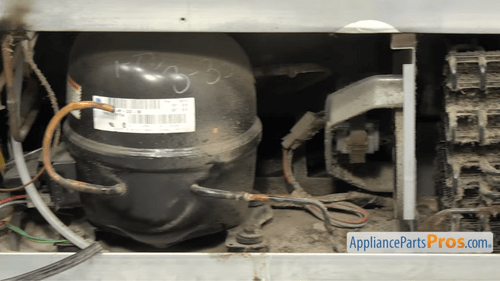
When you hear a clicking noise coming from the Kenmore fridge, check the following components:
A. Condenser Coils
Unplug the Kenmore refrigerator from the power outlet and move it away from the walls before removing the cover underneath the unit. This will expose the condenser coils, which you can inspect to determine if they need maintenance.
With regular use, the coils gather dust, resulting in clicking noises, so vacuum the dust and dirt away. You can wipe any stubborn dust particles with a cloth and also clean the condenser fan and compressor while you’re at it.
Sometimes a dirty compressor can produce clicking noises when it gets overloaded with dust and tries to reboot unsuccessfully. With the compressor stuck in this endless cycle until it burns out, the Kenmore refrigerator fails to cool.
B. Start Relay
The start relay is a small machine on the Kenmore refrigerator’s side body and might be the source of the problem when all the coils are clean. You can usually tell by detaching and shaking it – a rattling noise indicates that it needs replacing.
When there’s no apparent issue, conduct the multimeter test to check for continuity, and if it doesn’t register anything, it’s time to change it.
But why is the relay important? This is because it supplies power to the compressor, and a defective relay will hamper the normal functioning of your Kenmore refrigerator.
3. Buzzing Noise
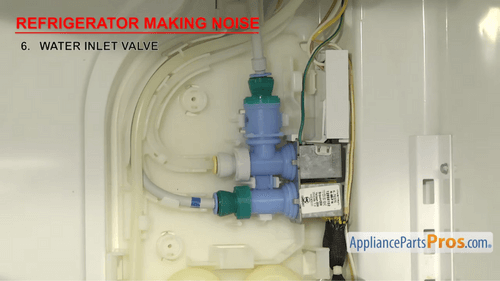
A buzzing sound could point to a faulty ice maker due to ice buildup on the fan blades or when the motor stops working. It also happens when this component fails to fill water and goes into overdrive, so check the water inlet valve and supply line to ensure an unobstructed water supply.
It would be best to inspect the ice maker first before scanning the other components. If it is fine, you can direct your attention to the evaporator fan located behind a Kenmore refrigerator.
Move the fridge away from the wall to ensure the fan motor is running, and there is no ice buildup on the blades. Wipe the blades with a clean cloth if necessary and fix the motor bearings to solve the problem; otherwise, the only option is to replace the damaged components.
Also, check the refrigerator compressor for dirt and debris buildup, which makes it malfunction. A faulty compressor emits a loud sound in such instances, so clean it and the coils or change the worn-out parts.
4. Kenmore Refrigerator Beeping Noise

One of the reasons for a Kenmore refrigerator to beep is when you leave the door open. A sensor sounds an alarm to alert you to the problem, so close the door and ensure no heavy items are pushing it from the inside.
Some people overstuff their units which causes the shelves to shift positions and foods to spill out. You can rearrange the shelves and empty some compartments to check if the door closes all the way through.
But if the door is closed, you should inspect the gasket since a worn-out gasket will also cause the unit to beep. When the gasket can no longer control the temperature, the temperature increases, and the fridge considers the door as open.
We recommend shutting the door while keeping a dollar bill between the seals. A functioning gasket will prevent you from pulling it out; otherwise, you will have to replace it.
However, a far more serious issue is excess ice buildup which activates the alarm, and because most units have an automatic defrost system, it means the system has failed. To defrost the Kenmore refrigerator manually, disconnect it from the power source and open the doors to melt the ice.
And don’t plug in the fridge before cleaning its interiors – switch on the power only after getting rid of the dirty water. Troubleshooting the defrost system now should stop the beeping, or you may have to replace one or more of the following components:
- Defrost heater
- Defrost control board
- Thermostat
- Defrost timer
5. Knocking Sound
The first step to stopping the knocking noise is maintaining sufficient space between the surrounding surfaces and the fridge. This is because the Kenmore refrigerator vibrates during operation, and placing it close to the walls will cause the unit to bang against it.
We recommend keeping the fridge 3 inches from the back wall while there should be enough space on the top of the unit. But here are some other things you should keep in mind:
A. Ice Maker And Water Line
When the pressure inside the water line increases, it often makes a knocking noise. Any obstructions to the water supply will send the ice maker into overdrive, resulting in more noise. Try to reduce the pressure and ensure the ice maker has a proper water supply.
If you don’t need the ice maker, it would be best to turn it off.
B. Condenser Coils And Fan
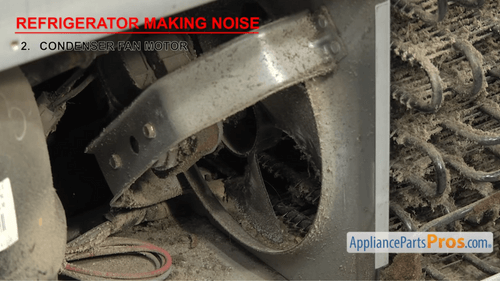
Dust accumulation on the coils hamper airflow into the condenser, and you should clean it twice a year. This will eliminate any knocking noise. While you’re at it, we recommend cleaning the fan and the condenser fan motor blade as well.
C. Compressor
The compressor is highly dependable but could produce humming, buzzing, or knocking noises due to lack of maintenance. Cleaning the compressor regularly will keep it in top shape and increase its lifespan.
6. Kenmore Refrigerator Popping Noise
Usually, when the Kenmore refrigerator makes a popping noise, you can bet that the fridge is running in defrost mode. As the unit defrosts and ice melts, water droplets landing on the heater might produce slight hissing or popping sounds.
Or there could be an issue with the refrigerator door, following which you will have to replace the door cam. Other components that cause a popping noise include:
A. Internal Components
If the internal temperature of the fridge falls, different parts expand and contract in the process, and you end up with a noisy Kenmore refrigerator.
B. Water Supply Valve
The water supply valve makes noise while supplying water to the ice maker. But a consistent popping sound means there’s an issue with the water supply, so turn it off and contact customer care.
C. Evaporator Coil
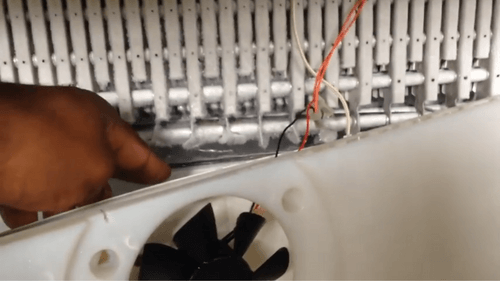
Evaporator coils experience temperature changes throughout the day and might make noise as they cool and warm. Again, a continuous sound from the fridge means the defrost system is malfunctioning, and the coils are getting colder than usual.
7. Gurgling Noise
People shouldn’t worry about their Kenmore fridge making a gurgling sound as it’s quite normal and means the unit is functioning smoothly. But there’s a catch – the unit should have a drain to eliminate excess water produced by ice melting from the evaporator coils.
As the water flows through the pipe and into a pan, it might produce a gurgling sound. If the fridge constantly makes noise throughout the day, it means that it’s defrosting non-stop and preventing the unit from cooling.
Another reason could be the refrigerant producing a noise while settling down in the tube, after which the pressure returns to normal.
8. Grinding Noise
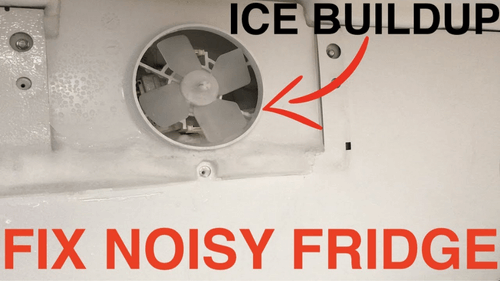
The evaporator fan blade is responsible for the grinding noise you hear from the Kenmore fridge. This happens due to excess ice buildup on the fan, and the blades produce a sound when they hit it.
In this case, simply unplug the fridge and open the doors for a couple of hours to melt the ice while storing all foods in another fridge.
9. Hissing Noise
When you notice your Kenmore fridge making hissing noises, check the following components:
A. Defrosting
During the defrost cycle, the heater melts the frost on the fridge’s cooling coils, and the subsequent water droplets fall on the heater, which produces a hissing sound. There’s no reason to worry as long as the hissing noise isn’t continuous.
B. Ice Maker Water Supply
At times the ice maker doesn’t have enough water for another ice-making cycle and makes a hissing sound. This could also be the issue with the water dispenser, so check both units to restore the water supply if needed.
C. Leaking Freon
A leaking freon points to gas leaking with a hissing sound from the Kenmore refrigerator, following which the dual compartments become warm. It will help if you contact a professional technician to resolve this problem quickly.
10. Rattling Noise
It’s slightly challenging to pinpoint where the rattling noise is coming from, and you will have to check several components, starting with the water filters. When the filters are not installed properly and remain loosely attached, they could vibrate while the fridge is running.
You should also check the drain pan, which usually rattles when the refrigerator is working. But it is never a continuous sound – in such a scenario, the drain pain is loosely attached to its compartment.
When both these components are working fine, inspect the compressor springs because they rattle if they are loose. You can either tighten the springs or replace them if they have worn out and fail to hold the compressor in place.
And don’t forget to check the condenser fan blades as they could have come loose or, even worse, might be hitting an object. Remove all obstructions from the area and clean each condenser fan blade to stop the rattling sound.
11. Squealing Noise
The squealing noise could either be coming from the condenser fan or the evaporator fan, so check both these components. In most cases, the issue lies in the fan motors, and it would be best to replace the faulty motors with new ones.
Why Does A Kenmore Refrigerator Make Noise When The Door Is Closed?
Ideally, a Kenmore refrigerator shouldn’t make noise after closing the door, but you might encounter any of the above problems. If you can’t pinpoint the type of noise, start by inspecting the evaporator fan, which could malfunction due to excess ice buildup.
You can tell by opening the freezer door because when the noise ceases, it means the fan is malfunctioning. We recommend removing the refrigerator’s inside rear panel to inspect the fan.
When there’s ice surrounding the fan, it means warm air is entering the fridge and could ruin the fan blades when left unchecked. It’s essential to manually defrost the fridge ASAP to melt the ice.
In case the fan blades are fine, you should focus on the evaporator motor, so turn the blades manually to determine their smoothness. A slight resistance or difficulty in turning the blades might point to an issue with the shaft – the only way to be sure is to conduct a multimeter test.
Test for continuity and check the motor windings to determine if the evaporator motor needs replacing.
Things To Check
To eliminate further noise-related issues, you need to maintain the Kenmore refrigerator in proper condition, and a crucial step is ensuring that the fridge is level. An unaligned fridge fails to close properly, so use a leveling gauge to determine how tilted the unit is.
Then turn the adjustment screws to raise or lower the Kenmore refrigerator until the gauge indicator is right in the center. This ensures that the doors close all the way and efficiently seal the internal components from warm air.
Also, a malfunctioning control board activates the refrigerator door alarm, or it could be that the door alarm was faulty in the first place. The only thing you can do is contact Kenmore customer care or hire a licensed technician to fix the issue.
It would be best not to fiddle with the refrigerator components when you lack technical knowledge, as things could go south very quickly.
Conclusion
When a Kenmore refrigerator makes noise, refer to our guide to find the relevant issue and solve it quickly.
There’s no substitute for regular maintenance, but even then, certain things are beyond your control. For instance, when freon starts leaking and the fridge fails to cool, it gives off a slight chemical smell, following which you should contact customer service.
Sometimes, the freezer also fails to cool all the shelves, or a section of the evaporator coils freeze due to ice buildup. A professional technician can assist you by making repairs, but if the components are broken, replacing them is the only option.
